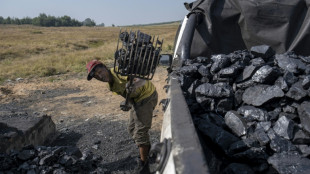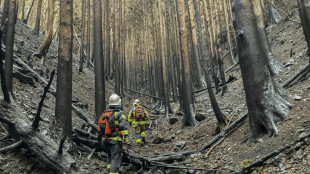
-
 Bosnian Serb leader says he is no threat to Bosnia
Bosnian Serb leader says he is no threat to Bosnia
-
Wales unchanged for Scotland Six Nations clash

-
 World's sea ice cover hits record low in February
World's sea ice cover hits record low in February
-
Liverpool must be ready to 'suffer' in PSG return leg, says Van Dijk

-
 Lithuania quits treaty banning cluster bombs despite outrage
Lithuania quits treaty banning cluster bombs despite outrage
-
Philippines' Palawan approves 50-year ban on new mining permits

-
 Prosecutors demand Rubiales forced kiss trial be re-run
Prosecutors demand Rubiales forced kiss trial be re-run
-
'We are not alone': Zelensky thanks Europe at crisis summit

-
 Doris delivers huge boost to Ireland for key France match
Doris delivers huge boost to Ireland for key France match
-
European court rejects bid to overturn Romania vote annulment

-
 Pope Francis resting, stable as nears three weeks in hospital
Pope Francis resting, stable as nears three weeks in hospital
-
South Africa says US withdrawing from climate finance deal

-
 European rocket aims for first commercial launch after delays
European rocket aims for first commercial launch after delays
-
As Trump woos Russia, Kremlin shifts blame to Europe

-
 Ntamack, Alldritt start for France in Six Nations showdown against Ireland
Ntamack, Alldritt start for France in Six Nations showdown against Ireland
-
Lyon owner backs Fonseca as coach despite nine-month ban

-
 S. Korea fighter jets accidentally drop bombs, civilians among 15 injured
S. Korea fighter jets accidentally drop bombs, civilians among 15 injured
-
Ukraine titanium mine hopes US deal will bring funds

-
 Taiwan says TSMC investment 'historic moment' for US ties
Taiwan says TSMC investment 'historic moment' for US ties
-
Ntamack, Alldritt start for France in Ireland Six Nations showdown

-
 Bayern's Neuer sidelined after costly celebration
Bayern's Neuer sidelined after costly celebration
-
DeepSeek success shows China's 'ability to innovate': official

-
 Thailand repatriates hundreds more Chinese scam centre workers
Thailand repatriates hundreds more Chinese scam centre workers
-
Charli XCX, Raye, Olivia Rodrigo to headline Glastonbury alongside legends

-
 China vows to fight US trade war 'to the end'
China vows to fight US trade war 'to the end'
-
Hamas says Trump's 'DEAD' threat to Gaza undermines ceasefire

-
 EU seeks unity on Ukraine and defence boost as Trump pivots from allies
EU seeks unity on Ukraine and defence boost as Trump pivots from allies
-
7-Eleven owner seeks to fend off takeover with buyback, US IPO

-
 Zelensky urges pressure on Russia after deadly hotel strike
Zelensky urges pressure on Russia after deadly hotel strike
-
New Zealand vow to 'find little ways' to beat India in final

-
 Rain checks spread of Japan wildfire
Rain checks spread of Japan wildfire
-
Sri Lanka police seek public help to arrest chief

-
 Global sea ice cover hits record low in February as world continues hot streak
Global sea ice cover hits record low in February as world continues hot streak
-
Asian markets rally on US tariff reprieve, possible China stimulus

-
 Acquittal of Fukushima operator ex-bosses finalised
Acquittal of Fukushima operator ex-bosses finalised
-
Chinese economy faces rising international 'uncertainty', official says

-
 Strikes hit Lufthansa profits, Olympics dent Air France
Strikes hit Lufthansa profits, Olympics dent Air France
-
Pope Francis resting after 'peaceful night': Vatican

-
 Osaka says Indian Wells loss 'worst match in my life'
Osaka says Indian Wells loss 'worst match in my life'
-
Rohingya refugee food aid to be halved from next month: UN

-
 Ethiopia's ancient instrument begena healing souls
Ethiopia's ancient instrument begena healing souls
-
'Erratic' cyclone creeps towards eastern Australia

-
 Lufthansa 2024 profits dive amid strikes, rising costs
Lufthansa 2024 profits dive amid strikes, rising costs
-
Russian missile strike on Zelensky's hometown kills three

-
 UN report finds women's rights weakened in quarter of all countries
UN report finds women's rights weakened in quarter of all countries
-
EU emergency summit seeks to beef up defence to counter Trump pivot

-
 Australian tennis great Fred Stolle dies aged 86
Australian tennis great Fred Stolle dies aged 86
-
South Korea air force jet accidentally drops bombs, injures civilians

-
 Osorio topples Osaka, Kvitova ousted at Indian Wells
Osorio topples Osaka, Kvitova ousted at Indian Wells
-
Frenchman's mislabelled war photos donation sparks China controversy


More protected areas won't save biodiversity, warn experts
Expanding nature preserves will not be enough to stem a rising tide of extinctions, a panel of experts warned Wednesday, taking aim at a draft treaty tasked with rescuing Earth's animal and plant life.
Setting aside at least 30 percent of both land and oceans as protected zones is the cornerstone target of the so-called global biodiversity framework to be finalised in May at UN negotiations in Kunming, China.
But a report by more than 50 top experts said the draft plan still falls far short of what is needed.
"We're in the middle of a biodiversity crisis, with a million species at risk of extinction," lead author Paul Leadley, a professor at Paris-Saclay University, told AFP.
"There's good evidence that we will fail again to meet ambitious international biodiversity objectives if there's too much focus on protected areas at the expense of other urgent actions."
The plan, under negotiation by nearly 200 nations, sets a score of targets for 2030 -- and aims by 2050 to reverse biodiversity loss and be "living in harmony with nature."
The world failed almost entirely to reach a similar set of 10-year objectives set a decade ago at UN talks in Aichi, Japan.
"We keep trying to treat a critically ill patient with plasters -- that has to stop," said Leadley.
Echoing a similar warning issued by the UN's science advisory panel for climate change, Leadley and his colleagues said reversing the damage done to nature will require "transformative change" in society, starting with the way we produce and consume food.
- Multiple drivers -
Policymakers must also realise that all the drivers of extinction -- habitat loss and fragmentation, over-hunting for food and profit, pollution, the spread of invasive species -- must be tackled at once.
"Biodiversity loss is caused by multiple direct drivers in nearly all cases, meaning that actions on only one or a few will be insufficient to halt continued loss," the report said.
Climate change is also rapidly emerging as a major threat to many animal and plant species on land and in the oceans, outpacing their ability to adapt.
Limiting global warming to 1.5 degrees Celsius above preindustrial levels -- "essential" for protecting nature -- is not adequately reflected in the draft targets, the authors say.
Earth's surface has already warmed 1.1C, enough to unleash a crescendo of climate-enhanced storms, heatwaves, droughts and flooding.
And it works both ways, the report warns: "Protecting and restoring biodiversity are key to achieving the climate mitigation and adaptation goals of the Paris Agreement."
- Nature-based solutions -
As with climate, there's no time to lose.
"The sooner we act the better," said co-author Maria Cecilia Londono Murcia, a researcher at Humboldt Institute in Colombia.
"Time lags between action and positive outcomes for biodiversity can take decades."
The report also takes the draft treaty to task for not spelling out how goals will be achieved and enforced.
Targets are all well and good, it suggests, "but it is how these targets are implemented ... that will determine success."
Other targets set for 2030 include:
- reducing by 50 percent the rate at which alien species are spreading across the globe;
- reducing nutrients such as fertiliser leaching into the environment by at least half, and pesticides by at least two-thirds;
- eliminating the discharge of plastic waste;
- using nature-based solutions to cut greenhouse gas emissions by at least 10 billion tons of CO2 or its equivalent;
- reducing subsidies that harm biodiversity by at least $500 billion (440 billion euros) per year.
"For every euro we spend globally to help biodiversity, we spend at least five on things that destroy it," said co-author Aleksandar Rankovic, a researcher at the Paris Institute of Political Studies.
Nations will gather in Geneva in March for technical meetings ahead of the crunch talks in April and May.
J.Horn--BTB
